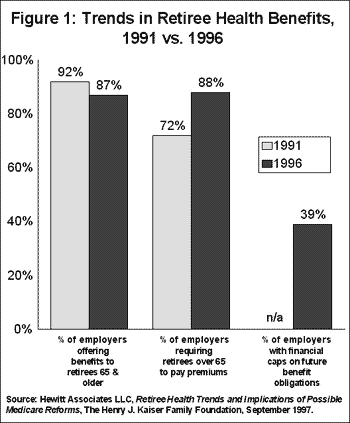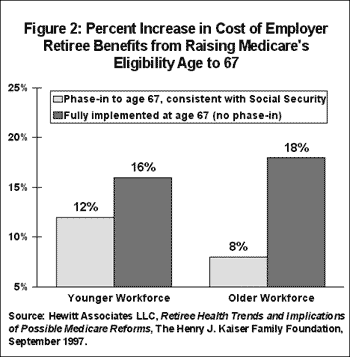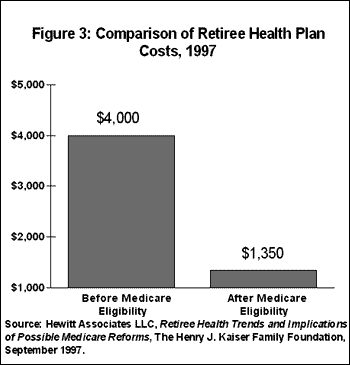Retiree Health Trends and Implications of Possible Medicare Reforms – Fact Sheet
Retiree Health Trends And Implications Of Possible Medicare Reforms
September 1997
Approximately 12 million of Medicare’s 39 million beneficiaries receive employer-sponsored retiree health benefits as a supplement to their Medicare coverage. In addition, millions of retired workers under age 65 rely on retiree health benefits as their primary source of health insurance coverage. While employer-sponsored health insurance is an important source of coverage for current retirees, health benefits for future retirees are uncertain.
Retiree Health Benefits Decline, 1991-1996
A declining share of large employers offered health benefits to retirees in 1996 compared to 1991, and an increasing share implemented reforms to limit their financial liability for retiree coverage (Figure 1), based on an analysis of a constant sample of about 600 large employers (with 1,000+ employees) conducted by Hewitt Associates LLC.

Availability of retiree coverage has declined:
Based on a constant sample of large employers, the share of employers offering retiree benefits to retirees age 65 and over declined from 92 percent in 1991 to 87 percent in 1996. Coverage for pre-65 retirees remained relatively stable. By comparison, the proportion of all large firms offering retiree coverage declined from 80% in 1991 to 71% in 1996, based on the Hewitt database.
Required payment of premiums has increased:
The share of large employers requiring post-65 retirees to pay premiums increased from 72 percent in 1991 to 88 percent in 1996; for pre-65 retirees, the share increased from 85 percent to 95 percent.
Use of financial caps has grown:
Dollar caps on future employer obligations for retiree health costs has emerged as a new feature of retiree benefits. In 1991, virtually no large employers had such caps; by 1996, 39 percent had caps on post-65 retiree coverage and 36 percent had caps on pre-65 coverage.
Other reforms have been implemented:
Between 1991 and 1996, a growing share of large employers tightened eligibility requirements, increased deductibles, raised contributions for dependent coverage, and increased enrollment of retirees in managed care plans.
The trend toward declining retiree benefits in the 1990s is due to a number of factors including: the pressure to control increasing health care costs; new accounting rules (FAS 106) which require companies to report accrued future retiree health benefit liabilities on their current financial statements; and employer concerns about the future financial impact of an aging population.
Medicare Reforms Affect Employer-Sponsored Retiree Coverage
Because retiree health benefits generally supplement Medicare for retirees age 65 and older, changes in the Medicare program are likely to affect health care costs incurred by both employers and retirees. For example, raising Medicare’s eligibility age gradually from 65 to 67 (linking the Medicare and Social Security eligibility age) would increase the actuarial costs for lifetime retiree benefits by 12 percent for large employers with a younger workforce and by 8 percent for employers with an older workforce (Figure 2). When fully implemented at age 67 (no phase-in), this change would increase costs by 16 percent for employers with a younger workforce and by 18 percent for employers with an older workforce. This is because the average per person cost of health coverage for a retiree before Medicare eligibility is about three times the cost of a retiree with Medicare coverage ($4,000 vs. $1,350, respectively) (Figure 3).


Changes in Medicare HMO payments could also impact retiree health costs. Higher Medicare HMO payments in rural areas, as enacted under the Balanced Budget Act of 1997, could encourage the migration of plans to rural areas and allow employers in these areas to move additional retirees into managed care plans. However, reductions in future Medicare payments to HMOs in other areas could make managed care a less attractive option for employers and retirees if HMOs respond to payment changes by offering fewer benefits or charging higher premiums.
More comprehensive Medicare reforms under discussion, such as a shift to a defined contribution program, could also impact employer-sponsored retiree coverage. Under a defined contribution approach, Medicare would pay a fixed sum on behalf of each beneficiary and beneficiaries could apply the amount to the cost of coverage from a variety of Medicare-approved private health plans. If Medicare’s defined contribution rate does not keep pace with medical inflation, additional costs are likely to be shifted to employers, retiree with employer-sponsored coverage, and other beneficiaries.
Issues
Employer-sponsored retiree health plans play an important role in covering retirees both before and after Medicare eligibility. Retirees are generally at an age when health problems tend to increase, annual incomes decline, and coverage for medical expenses becomes more critical. Since 1991, there have been declines in the availability and generosity of retiree health benefits offered by employers. Employers and retirees face significant financial risks from potential changes to the Medicare program because of the strong interaction between employer-sponsored retiree health benefits and the Medicare program.
This fact sheet is based on Retiree Health Trends and Implications of Possible Medicare Reforms, prepared by Hewitt Associates LLC with support from the Kaiser Family Foundation, September 1997. This study analyzed key trends in retiree health plans from 1991 through 1996 using a constant sample of large companies (generally those with at least 1,000 employees) in the Hewitt Associates database. The 1996 Hewitt database contains plan design information for 1,050 major employers. The study also analyzed the potential impact of Medicare reform options on retiree health plans.
Retiree Health Trends And Implications Of Possible Medicare Reforms:
Press Release Fact Sheet Report
